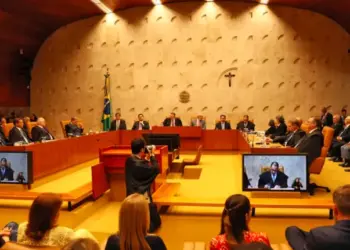Last Friday, July 21, Brazilian President Luiz Inácio Lula da Silva (Workers' Party) sanctioned a package of public security measures, named the Security Action Program (PAS). The package, articulated by the Ministry of Justice, includes, among other measures, a new decree that restricts civilian weapons, new police bases in the Legal Amazon, a bill still to be sent to the National Congress to combat attacks on schools and cross-cutting actions involving the Ministry of Culture.
In his speech at the event to launch the package, held at the Planalto Palace with the presence of governors, Lula addressed specific topics in relation to violence and public security in Brazil. One of the issues was the number of rapes in the country, which grew in 2022.
"It is an extremely serious thing. Most of it happens at home. It means that something is wrong in our family structure, in the way we are formed. It is necessary to format the emergence of a new society, of a new behavior. We will continue to take care of society, with peace and tranquility, but also with great security", he said.
Weapon restrictions
The Minister of Justice, Flávio Dino (Brazilian Socialist Party), celebrated the decision to restrict access to weapons. The text that was sanctioned provides for restrictions on access to ammunition, regulation of the operation of shooting ranges and shifts the role of overseeing the registration of weapons from the Army to the Federal Police.
"It is a thoughtful, balanced decree. Whoever says that every Brazilian should have a gun is an enemy of the police. And this government trusts the police," he maintained. According to the minister, the new rules will allow for greater inspection.
The text also stipulates that some weapons will once again be for the exclusive use of the Armed Forces and the police. According to Dino, rules are needed to prevent fraud that favors criminals, while preserving the rights of hunters and sport shooters.
The Minister of Justice also celebrated the implementation of 34 new police bases in the Legal Amazon. "Fighting drug trafficking in the Amazon is protecting the environment," he said.
'Normality'
According to President Lula, the public security package is one more of the federal government's efforts to "bring the country back to normality", one of the keynotes of the election campaign in 2022. The president mentioned the need for better articulation between the federal, state and municipal spheres in the public security area.
"Bringing the country back to normal is making things work the way they have to work. The first of these is harmony between federal entities. If we want to establish a security policy, we need to find a way for prefectures to participate in it. It's not from the top down that things are resolved," he said.
Flávio Dino, was in the same vein: "Public security is a difficult topic. Traditionally it is said that it is something that the states have to deal with. And what do we see? That we need unity. Not appropriating state competences, but helping".
According to Dino, public security policies need to be seen as part of a broader program, and he cited one of the elements of the sanctioned package: a public notice for peripheral cultural collectives. "In the first place: prevention and social justice. Income distribution and the improvement of living conditions is the main public security policy. The Brazilian State has to get close to the people in need. Culture is a way to compete with the criminal world," he pointed out.
Lula also criticized the imprisonment of people who carry out famine thefts, that is, of small monetary value and to meet survival needs, such as food and medicine: "These people get locked up for months. They stay there with no one to take care of them."
The president has not shied away from controversial issues involving public security forces, including their involvement in politics. Lula called for "more civility within the police", arguing that the political manifestation of police members should take place at the ballot boxes, and not involving the exercise of their attributions: "No one with a career in the State owes a favor to any President of the Republic or to any Governor of the State". On the other hand, he stated that "civil society needs to learn to live with the police as its own defense".



















